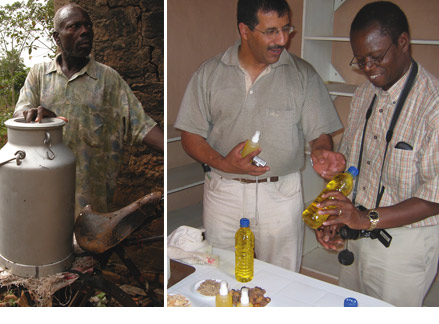


Bringing It All Back Home
by Rebecca McCarthy
Intro
|
Surviving The Amin Years
|
To Give Something Back
|
Promising Products

![]()
An Oppurtunity To Help Someone
Promising Products
So far, UGA students have designed three products targeting the poor: a solar-powered cooler for milk, a hand-operated nutcracker, and a solar-and-battery-powered egg incubator. The cooler will help dairy farmers in Uganda double their milk production; the nut cracker will let women in Morocco produce more Argan oil safely; and the incubator will increase the number of viable guinea fowl in Burkina Faso.
None of the three is quite finished, and Kisaalita said he doesn’t want to take on new products until one of them is “in the marketplace.” There are a few glitches to work out before they can be mass-produced and marketed at an affordable price. But various companies have expressed an interest, and Kisaalita is looking for the right match.

(Left) Currently milk from the night milking goes to waste because there is no way to cool and store it safely overnight. (Right) William Kisaalita (right) learns about Argon oil, some of which is exported for use in cosmetics. The bulk of Argon oil is used locally for cooking.
He has also applied for a grant from the Bill and Melinda Gates Foundation to build 20 to 50 incubators for Burkina Faso. Once these devices are operating successfully, he is hoping that a nongovernmental organization or a Burkina Faso solar-energy company will see the possibilities and take over production.
The milk cooler, sized to cool one large can, will safely store the milk overnight so that it can be processed the next morning. Cool Systems, a Germany company that makes beer kegs, is talking with Kisaalita about manufacturing the milk cooler.
Like his students, Kisaalita has learned what characteristics are necessary for a successful product: simple, affordable and operable by someone who can’t read. All three of the UGA machines satisfy these criteria.
But there is also the question of profitability—will they yield enough to sustain companies’ interests? “These devices are for the very poor, but there are so many of them that you can make money eventually,” Kisaalita said. “These are hard-working people who want to get ahead. They will figure out a way to pay.”
For more information contact William Kisaalita at williamk@engr.uga.edu.
Intro
|
Surviving The Amin Years
|
To Give Something Back
|
Promising Products
For comments or for information please e-mail: rcomm@uga.edu
To contact the webmaster please email: ovprweb@uga.edu
![]()